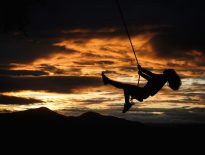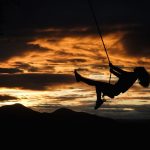I’ve always loved the rain. My mother says it rained heavily on the day I was born, thunderclaps eclipsing the sounds of her agonising wails as she pushed me into the cruel reality I’ve come to know as the world. I guess it makes sense that the sounds and smells that accompany the weeping skies have always made me feel comfortable.
I’ve always been angry at the world, discontent by the state of it, and unable to fully accept my place in existence. I often feel like my head is in the clouds, unable to settle and focus on anything. That all changes when the clouds decide to bare their watery contents upon the earth. Rain clouds are a welcome sight and thunderstorms are when I’m at my sharpest, almost as though the chaos that accompanies heavy rainfall is in sync with my tumultuous soul. Joy in buckets.
It was raining that day. I woke up to the pattering sounds of the raindrops hitting the rooftops. The weather was perfect and my mood, buoyant. I left for work that morning with a spring in my step, raincoat on, ready to take on the world. I was in my element, and it felt great.
I walked down to the bus stop and barely waited a minute before a Danfo bus stopped in front of me. “CMS” the conductor yelled, announcing their destination. “How much?” I asked. “200 Naira,” he responded, his breath tinged with the smell of ogogoro “I hold 500 Naira, you get change?” “Enter,” he said, so I got in.
The bus was sparsely populated, janky, and had a leaky roof. It made several suspect noises as we sped through the streets of Lagos. The cold wind rushed in through the windows, accompanied occasionally by tiny droplets of water that felt like a million little needle pricks on my face. There were six of us on the bus in total, eight if you counted the driver and conductor. The heavy rainfall probably discouraged most people from leaving their homes early, their loss.
We made good time, the usual morning traffic was non-existent, and soon we were ascending the Third-mainland bridge, the giant concrete monstrosity which was responsible for bridging the gap between the Lagos mainland, where I lived, and the Island, where I worked.
This dynamic was commonplace amongst Lagosians. Many of us have to wake up at unholy hours in preparation for this daily commute to and from our places of employment. In Lagos, if you had a 9 to 5 job then it wasn’t really a 9 to 5, it was a 5 to 9.
Our ascent was rapid, the driver seemingly in a hurry to complete his first trip of the day. The other passengers did not appreciate this. “Driver slow down, be careful,” they interjected, their words bouncing off the walls of the old bus and producing an effect akin to that of an echo chamber.
The driver did not take kindly to the criticism of his driving. “Who dey shout for there? You want make God punish you this morning?” he yelled, displeased. “It is you God will punish, idiot!” a female voice behind me shrieked in reply. I found the exchange slightly humorous, able to see the lighter side of what I felt was an unnecessary exchange of words. The driver, however, did not.
Incensed by this response, he turned around with a mouthful of curses aimed at the lady who was bold enough to defy him. What followed was, for all intents and purposes, a series of unfortunate events. The driver, lost in the heat of the moment, seemed to forget that he was behind the steering wheel. The passengers, myself included, screamed at him to focus on getting us safely to our destination.
The bus veered out of control, and by the time the driver realised he was supposed to have his hands on the wheel and eyes on the road, it was too late. We were headed towards railing at high speed, the weathered bus tires made extra slippery by the rain-soaked turf, and then, we fell off the bridge. It all happened so fast, yet slow. Time seemed to stop in that moment as I braced for impact, the waves of the Atlantic waiting to swallow us in its cold depths.
“Is this it? Am I going to die?”
We hit the water hard, hard enough to kill the driver on impact. Fitting that he died first, the current situation was both his doing and undoing. The bus filled up with water fast, sinking deeper and deeper. It took a while for me to realise that I was drowning. I’d read about it, but experiencing the stabbing pain in my eyes and ears and the fire in my chest as my lungs oh so desperately sought for air, was surreal.
I willed myself to move, willed myself to find a way out of the bus that seemed destined to become my final resting place. All I could manage was a pathetic struggle against the current, as we sank further into the depths of the Atlantic.
“Move, MOVE! MOVE!!”
This wasn’t supposed to happen. I was supposed to be in my element, at my best, unstoppable, ALIVE. At some point, after what felt like forever, I stopped struggling, and it felt as though the chaos of the raging currents were finally in sync with the raging of my tumultuous soul.
It was raining on the day I was born.
It was raining on the day I died.
Read – My Husband Never Left – A Short Story by TJ Chikambure, Zimbabwe







